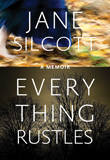In Joan Didion’s essay “On Keeping a Notebook,” she writes “Remember what it was to be me: that is always the point.” Such simple words, but the personal essay is an intimate form, full of reflection and creative misremembering, or as Didion calls it, when note taking, “lies.” In Jane Silcott’s first collection of essays, Everything Rustles, the short memoir form thrives as a focussed and grounded look into the everyday life of its author, complete with the sights and sounds of Vancouver and the natural landscapes of the West Coast during family camping season. With essays that come back to the idea of committed love, like the love between a mother and child, or a writer and language, or a middle-aged woman and her aging body, Silcott achieves Didion’s “point” of focussing on the self’s experience with eloquence and wit.
The book works toward a deep reflection on mid-life. Silcott writes about coming to motherhood late, recovering from physical injuries, needing space from her family, and losing her aging parents. Told with humour and a conversational style, Silcott’s essays examine the moments, pangs of anxiety, disappointments, and losses that paved the way to her mid-life. Organized into four sections, her writing illuminates her journey with crystal-clear imagery, such as her description in “Methuselah” of a motorcycle gang taking off from a motel: “ … they gunned their bikes then, the roar of their engines slamming into us like fists, or declarations” (115).
Though her writing style is crisp and relaxed, Silcott’s self-deprecatory tone does weigh in a bit heavy at times; however, I admire how each of these stories is her own. In “Praying Women,” Silcott describes the conversation of two women she overhears in a coffee shop. Instead of playing the role of a writer voyeur, she brilliantly writes about her inadequacy to keep up with the conversation, settling instead for the few snippets she can hear over the bustle of the café to think, and eventually write about.
In “Threshold” she writes, “[e]very day I unlearn” (27), and in her preface she writes “I started writing this book years ago, long before I knew I was writing a book,” and with that I think Everything Rustles captures one of the great essences of life and, perhaps, memoir writing: once you realize your life, with all its joys and disappointments, is happening whether you like it or not, you’re halfway through what you started.














